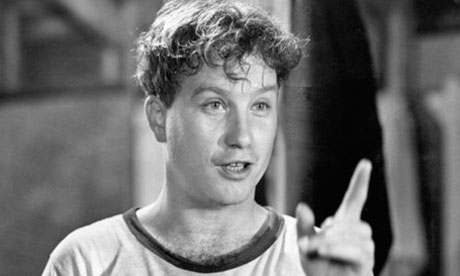
Just a year shy of its 40th anniversary, The Apprenticeship of Duddy Kravitz has been proudly spruced up and reissued; an act of reclamation, in some level, for a film that back in the early 70s, was one of the first Canadian features to make an international impact. Adapted from Mordecai Richler's 1959 novel set in a Jewish area of Montreal about a bustling young man furiously angling to get ahead – the missing link, if you will, between Budd Schulberg's What Makes Sammy Run and Philip Roth's Goodbye Columbus – Duddy Kravitz is an affectionate picaresque detailing the push-pull impact of the new world on émigrés from old Europe. Clan loyalty contends with ruthless self-advancement; expediency with tenderness; ambition with gullibility.
The film also provided a tremendous showcase for a mid-20s Richard Dreyfuss, whose blazing, restless performance marked him out as a major talent. Dreyfuss wasn't exactly a newbie at the time – he'd already done American Graffiti – but this was his first proper lead and he nailed it, pure and simple. (The boiling charisma he exudes in every second of the film has the slightly unfortunate effect of sucking all the acting oxygen out of every scene: everyone else in the film seems pretty colourless in comparison.)
The opening scene sets the mood: Kravitz is part of a cadet marching band (the flag leading them out, incidentally is the Union Jack; the maple leaf wasn't adopted until 1965, six years after the film's setting) and spends his time tripping up his fellow cadets, blowing up condoms, until finally diving into the cab of a convenient truck to escape. Kravitz then proceeds to embark on a number of money-making schemes – from working as a waiter in a fancy resort to hiring a washed-up documentary-maker (played by, of all people, Denholm Elliot) to support a business filming weddings and barmitzvahs. In fact, the sequence in which an irate Elliot tackles his first barmitzvah as if he's Robert J Flaherty is arguably the funniest of the film – and the "artistic" documentary he produces is shown in its entirety.
What is perhaps most interesting, four decades on, is the extent to which Kravitz and his contemporaries are so mired in the complications of their ethnic identity. His older brother Lenny is drawn to the high Anglo world around them, to the extent he calls himself "anti-semitic"; Duddy, himself, resents the intellectual socialism of his rich uncle, deriding its essentially submissive nature. Duddy – or "Doody", as most of his contemporaries seem to call him – exemplifies the youthful ethnic energy that had revolutionised American cinema since Dustin Hoffman in The Graduate; Dreyfuss' Kravitz is a twitchier, sweatier, more Philistine version, but one equally capable of grabbing the imagination. Dreyfuss would go on to bigger things, but not all of them better.

